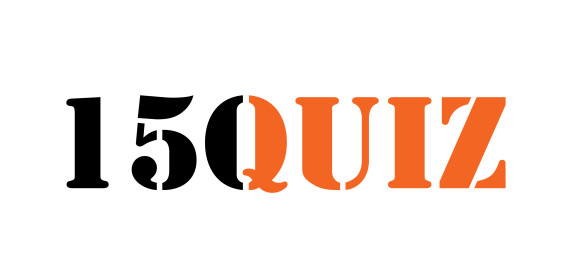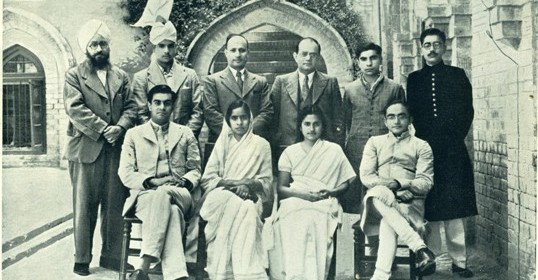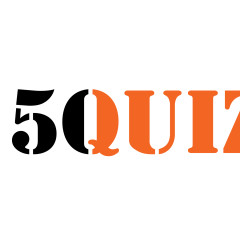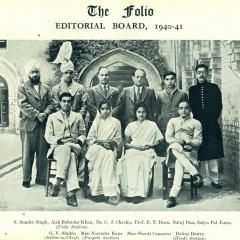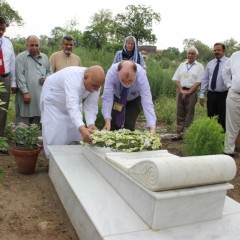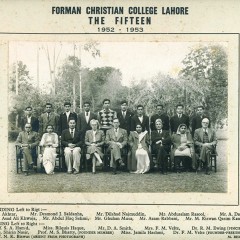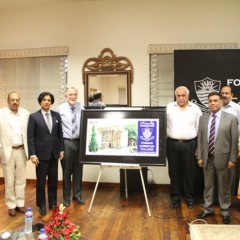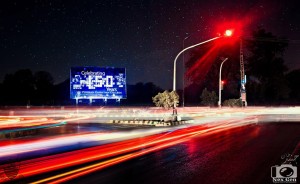October 150 Quiz Answers
Roaming around the beautiful FCC campus will give you the answers to this month’s quiz, which is all about numbers. 1. The Chaudhry Ahmad Saeed Building is the seat of administration at FCC. What is the maximum number of people allowed in the only lift in the building? 8 2. Intermediate students have lockers in the Seemi Tajammul Building (A Block). What is the highest number locker in the building? 378 3. The octagonal courtyard (S-Octa) in the Armacost Science Building is reminiscent of old Lahore architecture. How many arches can be seen from the courtyard? 34 4. A number of tree planting ceremonies have been held in the Rose Garden. How many pine trees grow there? 4 5. Sinclair Hall has a large number of freestanding columns along all four sides. What is the total number? 62 6. The front of the Business & Social Science Building (E Building) faces the new car park. How many windows are there in the front facade? 49 7. The new car park, accessed from the Canal Road service lane, has separate sections for guests’ vehicles, motorbikes, and faculty/staff cars. How many parking spaces are there for cars? 410 8. The Mercy Health Center was inaugurated last year to provide round the clock health facilities to residents of the FCC campus. How many beds does it have for patients? 6 9. The Ewing Memorial Library stores its Religious Studies books in a small but beautiful galleried room with an internal staircase. How many bookcases are there in the room’s lower part? 11 10. And finally … what is the number of the Communication Office’s new room? 217...
The Story of Folio
The Folio can rightly claim to be the oldest college magazine in West Pakistan. Its inaugural issue came out in November 1903. It was then a monthly publication containing about thirty pages. Annual subscription was fixed at Rs. 4 for students of the college and Rs. 3 for members of the Graduates Association, as the Alumni Association was then known. The magazine at that time was known by the simple name of the F. C. College Monthly and it was managed exclusively by the members of the teaching staff, who hastened to assure their readers that the bringing out of this journal was “not an aimless task”. “The college staff,” says an editorial note, “is not suffering in the least from lack of work. All are very busy men but so earnest is their desire to supplement the work of lecture room by perpetuating, in a sense, the relation which they bear to the pupils here that they most cheerfully assume this additional burden.” The staff members in charge of this publication, who chose to remain anonymous, laid down that the policy of the journal shall be “to speak the truth in love and to abstain scrupulously from anything savouring of harshness and uncharitableness in our judgements of opinions of others who honestly differ from ourselves”. This, in the year 1903, must have seemed downright radical. The main aim was, however, confined to enabling old students to keep themselves in touch with the college and its work. Expectations and hopes were realistic and pragmatic rather than enthusiastic. “Should experience prove that we can be helpful to graduates, undergraduates and other English speaking gentlemen of North India, the task now undertaken will be one of very genuine delight.” The magazine, apart from a few articles, contained some regular features like news about old boys, current life of the college, “science” and “notes and comments” which consisted of commentaries on various happenings at home and abroad. In the first issues, there was a note on the Investiture of the Nawab of Bahawalpur. Another ran like this: “We witness with dismay that at parties where Indians are the host and Europeans are guests a liberal supply of intoxicants is provided.” There were also comments upon the struggle in England between Free Traders and the Protectionists, the fact that MA English classes have been started in both F. C. and Government Colleges and “the hope that cordiality will prevail between the two colleges without the objectionable spirit of rivalry”. There was also a small article on Wireless Telegraphy which began: “By improving his ingenuous apparatus, Signor Marconi has made considerable progress in...
Wreath Laying Ceremony at Dr Charles Forman’s Grave
On Friday 8 August 2014, the Rector Forman Christian College Dr James A Tebbe and Formanite Mr Akhtar Hafeez Randhawa laid a wreath at the grave of Dr Charles W Forman in the Christian Cemetery near Taxali Gate. The brief ceremony, organized by the Advancement Office, was one of the many events F C College has held to mark this anniversary. Mrs Beth Tebbe, wife of the Rector, also laid a wreath at the grave of Mrs Margaret Forman, wife of the Dr Forman. Senior alumni, faculty and staff of FCC were present at the occasion. FCC Chaplain Rev Babar Rana said a prayer of thanksgiving for the life and service of Dr Forman....
An Interview with Jamila Hashmi
Author Jameela Hashmi did her MA in English from Forman Christian College. She started her writing career by contributing to the student magazine Folio. She was a also member of the prestigious literary society “The Fifteen”. The following are translated excerpts from an interview she gave to FCC students for the Golden Jubilee issue of Folio magazine in 1985. Folio: What did you study and from which institutions? JH: I was born in Amritsar and my early education took place there. I did my Matric from Hoshiarpur while living in a hostel. We came to Pakistan at the time Partition because there was so much violence and bloodshed in Amritsar. I did my Intermediate and BA as a private students because after coming to Pakistan I couldn’t get admission into a college immediately. But in 1952 I did get admission, to do MA English at F C College, Lahore. Dr Ewing was my tutor. Dr Velte had previously stopped teaching and gone back to the States, but our batch was the first batch he taught after he returned to FC. Dr Sheets and Professor Biswas were also our teachers at the time. Folio: Was Dr Enver Sajjad also a student at FC at that time? JH: No, he came after us. Folio: You chose English Literature for your MA. Were you especially interested in the subject? JH: No, I had no special interest at the time. I just decided to join in English, since I had to study something. But once I had taken admission, I became very interested in the subject and I worked very hard. The students of those days used to work like labourers when it came to their studies. We had to take all the notes ourselves, we couldn’t get ready-made notes. Folio: Why did you decide to join FC College? JH: I first took admission in Government College Lahore, but I left it to come to F C College because the environment and teachers really impressed me. It was the chance of a lifetime that I could study under Dr Velte, under Dr Sheets. These were teachers who had something to give to their students. You have no idea of the difference between FC College of those days and FC College now. [Ed: The interview took place in 1985 during FC College’s nationalized phase.] When I think about those times they seem like a dream. Our class was held in the upper floor of the Library block. At that time any book would be available in the Library, and all the book shelves were always unlocked. You could take out any book, whenever you wanted....
Postmaster General Punjab and Rector FCC unveil FCC Commemorative Stamp
On Monday 9 June 2014, the Postmaster General Punjab Province Lahore Fakir Syed Shaharyaruddin and the Rector FCC Dr James Tebbe, unveiled a commemorative postage stamp highlighting 150 years of Forman Christian College (FCC). Mr Sikander Jalal, Joint Secretary Ministry of Postal Services & Communications, also participated in the unveiling. Other distinguished guests from Pakistan Post Lahore included Postmaster General Ms Robina Tayyab, Deputy Postmaster General (Administration) Syed Shoaib Ali Jaffri, Deputy Postmaster General (Operations) Dr Muhammad Akram Nawaz and Chief Postmaster Mr Rizwan Qadeer. Mr Muhammad Shakoor, Assistant Deputy Director General (Philately), came from Pakistan Post Islamabad and Deputy Secretary Dr Munir A Khan from the Ministry of Postal Services & Communications, Islamabad. Deans and senior staff from FCC also attended the function. The stamp depicts Sinclair Hall which was constructed to mark the centenary of FCC and named after a dedicated Principal, Dr E J Sinclair who served FCC for over fifty years as a faculty member and from 1962-1968 as Principal. The building was designed by architect Nasreddin Murat Khan who also designed the Minar-e-Pakistan. The depiction is by watercolour artist Anjum Zaheer. Fakir Syed Shaharyaruddin and Mr Sikander Jalal, who are both Formanites, shared their memories of FCC and congratulated their alma mater on successfully completing 150 years of service to the nation. A presentation on Pakistani Philately by renowned historian Fakir Syed Aijazuddin concluded the event. ...
Winner of May 150 Quiz: Adeel Riaz
Congratulations to Mr Adeel Riaz, Director Prospect Research in the Advancement Office, for getting the highest marks in the May Sesquicentennial Quiz. This month’s quiz seemed to stump many of you and Adeel did very well to get 8 out of 10 answers right. Runners up with 7 answers right were Mr Najamul Sahar, Haroon Eleazer, Hafiz ur Rahman Hadi, and Dr Sufian Aslam. Don’t forget to try out the June 150 Quiz which will be uploaded on Monday 2 June 2014. Please contact the Communications Office, room 222, N Block to collect your voucher. The answers to the May 150 Quiz can be seen at this...

